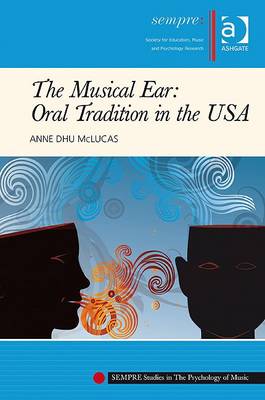SEMPRE Studies in the Psychology of Music
1 total work
"The Musical Ear: Oral Tradition in the USA" provides a wide-ranging look at the role played by music that is passed on aurally without the use of notation, in the folk, popular and art musics of North America. Professor McLucas argues that without the broad underlying oral repertoire of folk music, many musical styles - from that of the eighteenth-century singing schools to the minstrel tunes of Foster, the orchestral music of Copland and the jazz compositions of Armstrong and Ellington - would not possess their distinctive rhythmic and melodic content. Without the strong processes of oral tradition - its ability to communicate effectively to a particular ethnic or social group - American popular music would be much less multi-dimensional and vital. And without the idea that every man and woman has a voice and is entitled to sing (or play), the more elitist view of European music might be stronger than the participatory model appropriate to a democracy. Found within the many oral traditions of the United States are common elements that apply to all human cultures.
These elements are connected with the human mind, the limits of memory, the power of organization and the urge toward creativity. In order to study the process and to find the common elements, McLucas provides an overview of recent research on the brain and memory in order to help the reader understand the inner workings of oral tradition. The book is in part a reaction to recent comprehensive histories of American music that focus on written art and popular music and do not do justice to either the prevalence of oral tradition or to its pervasive influence on American music. It is this imbalance that the book redresses.
These elements are connected with the human mind, the limits of memory, the power of organization and the urge toward creativity. In order to study the process and to find the common elements, McLucas provides an overview of recent research on the brain and memory in order to help the reader understand the inner workings of oral tradition. The book is in part a reaction to recent comprehensive histories of American music that focus on written art and popular music and do not do justice to either the prevalence of oral tradition or to its pervasive influence on American music. It is this imbalance that the book redresses.
